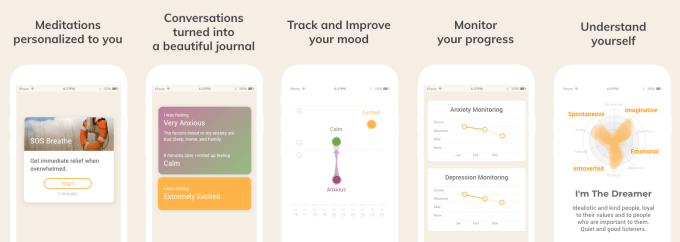Youper, a chatbot that helps users navigate their emotions, raises $3 million in seed funding –... - 4 minutes read
Youper, a mental health app with a chatbot it calls an “emotional health assistant,” has raised $3 million in seed funding from Goodwater Capital. The funds will be used to accelerate development of Youper’s artificial intelligence-based capabilities and grow its user base.
Based in San Francisco, Youper was co-founded in 2016 by Dr. Jose Hamilton. For a decade, Hamilton worked as a psychiatrist in clinical settings, seeing more than 3,000 patients. While talking to them, he realized that a handful of barriers kept many people from seeking help earlier, even if they had dealt with anxiety or depression for years.
“The first one is fear, taking care of yourself, talking about your mental health, understanding your mental health,” he tells TechCrunch. “Seeing a therapist or psychiatrist is super intimidating. That’s why all of my patients used to say the same things. The second barrier is cost, of course. Psychiatrists and therapists are super expensive.”
Hamilton teamed up with co-founders Diego Couto, the startup’s chief product and growth officer, and Thiago Marafon, its CTO, to create an app that would make mental healthcare less intimidating and more accessible. They originally created an app that did not have a conversational interface. Instead, Hamilton says it took a similar approach to Calm and Headspace. But that resulted in a very low user engagement rate and after a year, the team realized Youper needed to provide a more personalized experience, matching users to the right psychological techniques, including cognitive behavioral techniques and mindfulness, for their needs.
Youper is part of a growing roster of apps that use AI-based chatbots to help users improve their emotional health, including Woebot, Wysa and X2’s Tess. Hamilton says Youper wants to differentiate with its focus on personalization, combining mental health research and user data to match the right psychological techniques with users.

Screenshots from Youper, an app for emotional well-being.
The startup claims Youper has been downloaded more than one million times so far. Most of its users are young adults and that there are more women than men who use Youper.
“I think that’s because women are facing new challenges in our society by conquering new spaces and assuming new roles, and that poses an emotional toll. Another reason is that women are more tuned into self-care than men,” he says. “Sometimes I feel that we men wait for too long suffering in silence.”
For users who have never consulted with a provider, Youper provides a gentle introduction to the types of questions and exercises they might experience in therapy. The questions and exercises given by Youper’s chatbot are meant to help users achieve a better understanding of their emotions, thoughts and behavior.
Youper’s chatbot asks users to focus on their thoughts and identify how they are feeling from a menu of descriptive words. Then a scale that lets them rate the strength of that emotion from “slightly” to “extremely.” More questions help them narrow down what is causing those feeling and track their mood. Users are also given options for mindfulness exercises and journaling prompts.
Hamilton says that the average time users spend during each session with its chatbot is about seven minutes, with 80% reporting a reduction in negative moods after one conversation. The startup also claims that after 30 days, a quarter of people who signed up for Youper are still active users.
Youper is currently free, though the company may test a freemium model in the future with premium features. It uses anonymized user data in its own research to improve Youper, but keeps it private and does not share or sell user data or information.
Of course, an app is not a replacement for seeing a therapist or psychiatrist, but Youper presents a much lower barrier to entry for people who worried about the stigma of seeing a professional. Hamilton says he hopes using Youper will encourage more people to seek medical treatment sooner if they need it by making them more comfortable with the idea of discussing their emotional health.
“On average, it takes 10 years for someone to finally talk to a health provider. This could become 10 minutes with an app like Youper,” Hamilton says. “Having an app with a super low barrier to entry, no stigma, something that is about emotional health and taking care of yourself, shows that you don’t need to be afraid.”